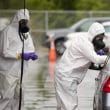Robert May Commentary
September 27, 2011
While I broadly agree with much of what Rob says, I do think his essay is more than a little generalizing from the USA to the world. And I also think it is a bit naïve when it fails to mention the active and very professional lobbies of denial (much of whose work has explicit connections with the same professionals who ran campaigns denying that smoking causes lung cancer).
So my first thought is that it might be a good idea if you took into account the recently published and excellent book entitled Merchants of Doubt. This makes rather clear that no matter how you went about presenting things — and I do have a lot of admiration for much of what you are suggesting — you would still be up against a very powerful and very skilled lobby of flat denial.
Second, I think what the UK has done makes a lot of sense, even if it is not working as perfectly as one would like. To begin with one headline statistic, surveys show that something like 80 percent of the general population here agree that climate change is real, largely human produced, and very serious (these are professional polls with properly randomized sampling). We also have detailed legislation creating a commitment to targets, backed up by an expert consultative process to set the targets and monitor them. In setting the targets, we begin by taking the IPCC estimates (along with their uncertainties) about what we should be aiming for by 2050 if we are to have no worse than a 50/50 chance of exceeding 2 degrees Celsius (which is also a less than 1 percent chance of exceeding 4 degrees Celsisus). We then divide this by the estimated global total population in 2050, to get the output per person. The UK’s fair share is then to meet this target, which means a massive (more than 80 percent) reduction in the UK’s per capita output. Given this target, the Committee has recommended an achievable trajectory to 2050, and much more specifically to 2020. We are on target at the moment, but on the other hand that is partly through the actions that have been taken, but equally importantly through the effects of the recession.
Third, what is happening in the UK is so vastly different from what is happening in the USA, that I do not think it makes sense to make general statements about what the world is doing without acknowledging the colossal differences between other countries — and what, from the outside, looks like collective insanity in the USA at the moment.
As ever, I have stated my opinions with excessive emphasis! I do think the questions that you are raising are important, and I do think that on occasion we are all guilty of not giving sufficient emphasis to the fact that — although it is by this time certain that climate change is real, human created, and worrying — there remain very significant uncertainties about a lot of the details of non-linear processes and consequent timescales.The issue of global population size is also a key factor, one that is difficult to state explicitly, although again the Climate Change Committee in the UK has done so. But I can imagine that it would be virtually impossible to raise that issue given the religious right in the USA at the moment.
In short, I approve broadly with what you are doing, but do urge upon you a somewhat wider perspective.
Robert May
Professor of Zoology
EXPERT COMMENTARY
Oxford University and Imperial College of London; former president of the Royal Society













